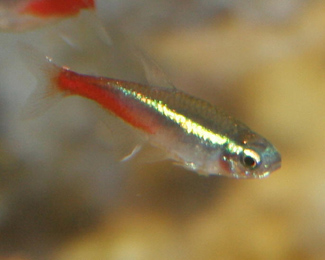Neon tetra – Paracheirodan innesi
The Neon tetra comes from Peru. In the wild it can be found in clear water streams. Care must be exercised when keeping these fish, they are small and will be considered prey by larger predatory fish including angelfish. It is best to keep these fish in groups. 
Maximum Size: The maximum length is 1.5 inches.
Minimum Tank Size: 10 gallons or larger tank is appropriate.
Care Level: The Neon tetra is a hardy fish. On a scale of 1 –10, (10 being easy) it would rate a “8”.
Tank Conditions: Temperature 68 - 76°F; pH: 6.0 – 7.5.
Description: The common neon tetra has a torpedo shape. The back has a blue neon streak running horizontally down to the caudal fin. A red stripe starts right after belly and runs horizontally to the caudal fin.
Temperament: Neon tetra are small, peaceful fish. They are compatible with other active fish of similar size. Like most tetras it does best in groups
Diet: Omnivore feed flakes, along with brine shrimp, bloodworms or frozen foods. With proper feeding and habitat maintenance, the neon tetra should show its best colors.
Habitat: Provide with live plants, rocks, driftwood and even leaves to mimic its natural habitat. There should be gentle surface water movement
Lighting: No special requirements in lighting are necessary for the neon tetra.
Compatibility: Neon tetra in general can be kept with most other species that can handle the ph and temperature requirements. This is a mild mannered fish and is often times eaten by larger/predatory tank mates. Angelfish, larger barbs and cichlids are not good choices. It is best to keep in groups.
Remember that as you look to add more fish to a tank, you will need to increase the tank size. As with all aquarium setups, whether it is fresh or salt, consideration needs to be given to the maintenance of water quality. Too many fish can result in poor water quality that can stress and even kill our fish.
|


